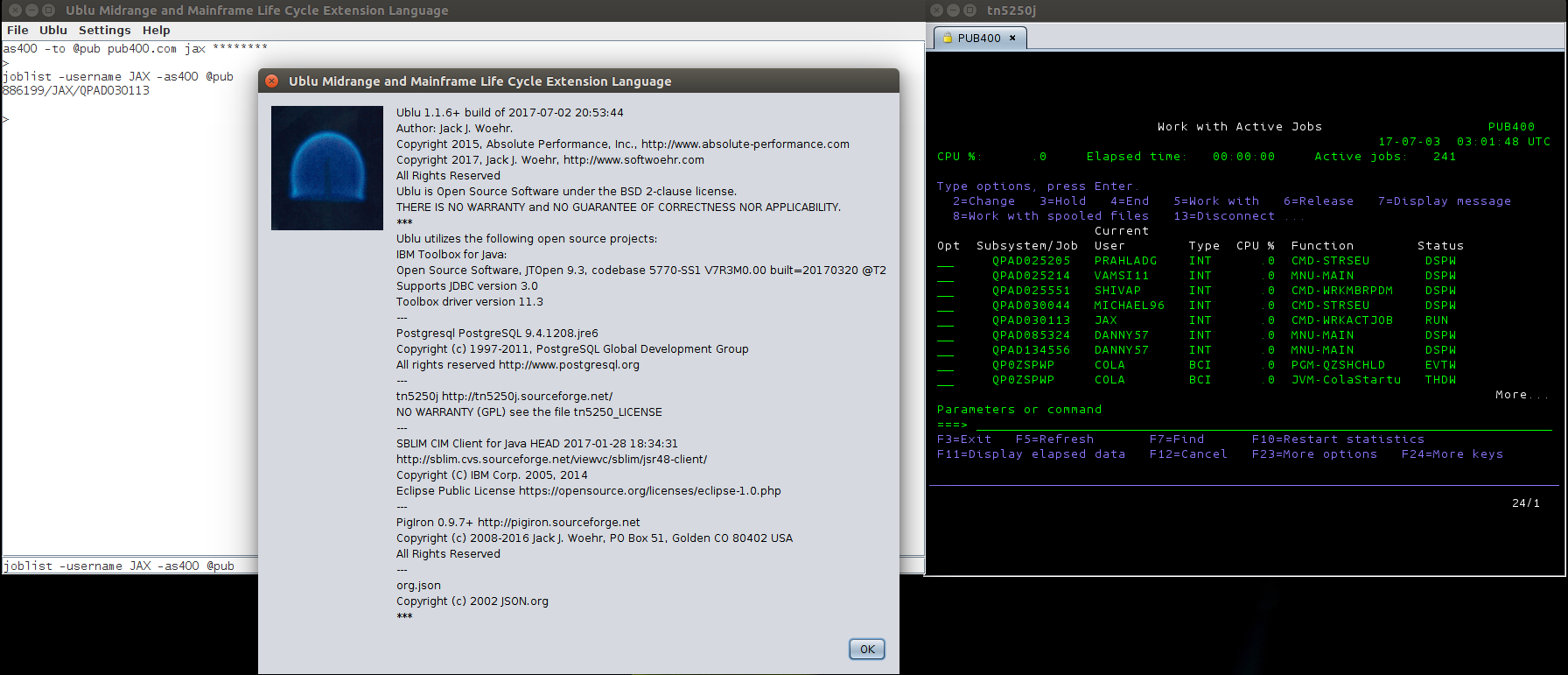Ublu Midrange and Mainframe Life Cycle Extension Language
Copyright (c) 2015, Absolute Performance, Inc. http://www.absolute-performance.com
Copyright (c) 2016, 2018, 2022, Jack J. Woehr http://www.softwoehr.com
All rights reserved.
See file LICENSE for license information.
Ublu is an interpretive language for remote systems programming of midrange or mainframe hosts from a Java platform such as Linux, Mac, OpenBSD or Windows. It also can run natively on IBM i ®, IBM z/OS USS ® or any other reasonable Java platform including Android UserLAnd.
I wrote Ublu because I wanted a language to run on OpenBSD/Mac/Linux/Windows to perform ad-hoc process automation primarily on IBM i. I was supporting consulting clients by writing individual utility programs using JTOpen which I have used since 1998 to control the AS/400. I decided to consolidate the programs in a language, and the result is Ublu. Ublu is a work in progress, as there is always more one could add.
Additionally, Ublu can call Java directly allowing the user to extend the language interpretively in nearly any direction desired.
Running Ublu directly on IBM i is especially useful for modelling processes which you might later wish to code in straight Java. Or maybe you'll leave them in Ublu. Whatever works!
Ublu is Open Source Software under the BSD-2 license.
The user's guide is userdoc/ubluguide.html
The full reference is userdoc/ubluref.html
Here's an example of Ublu code
The example is syntax-colored using a jEdit edit mode provided with Ublu.
The latest release version of Ublu is version 2.0.0.
Ublu is distributed with some of the open source libraries it needs and their license files which permit such distribution.
Others are fetched into the project at build time via maven.
Ublu is already a stable and useful tool which has seen much use in the real world. It is neither complete nor perfect, but what is in this world? As with all open source software, there is NO WARRANTY nor GUARANTEE include as regards suitability for any given application.
Download the release, unpack and java -jar ublu.jar to run Ublu.
Or clone the source for Ublu and do a maven build:
- Clone the Ublu GitHub repository or download source from the latest release
- Load the project in NetBeans or Eclipse or cd to the top dir of the checkout and type
make clean distwhich will run the appropriatemavencommands for you. target/ublu.jaris the runtime system.java -jar target/ublu.jarto run Ublu as a plain Java console application.
Note regarding checking out the current source: Release versions of Ublu come with a standard release of JTOpen. Between Ublu releases, I build and sometimes modify JTOpen so that Ublu can leverage forthcoming features of JTOpen. When you check out the source between releases, it is an intermediate version JTOpen that is checked out with Ublu.
Ublu's interpreter relies on Java's console support, which is very weak. So I have coded Goublu in Go language.
Goublu is a console front-end that provides an editable Ublu command line. The go command
go get -u github.com/jwoehr/goublu
will fetch the source to your $GOPATH/src directory. cd $GOPATH/src/github.com/jwoehr/goublu; ./make.sh to build Goublu for your architecture.
You can start Ublu in a window with the -w [propsfilepath] switch.

Report bugs or make feature requests in the Issue Tracker
There is some more information in the Ublu Wiki including zine article references.
Discuss Ublu in the IBMiOSS Java forum on Ryver.
Here is the IBMiOSS signup page for the free Open Source Software on IBM i organization on Ryver that hosts the Java forum.
The default branch has been renamed!
master is now named main
If you have a local clone, you can update it by running:
git branch -m master main
git fetch origin
git branch -u origin/main main
git remote set-head origin -a
The Software Bill of Materials (SBOM) is SBOM_ublu_jwoehr_*.json
Jack Woehr 2023-06-07


